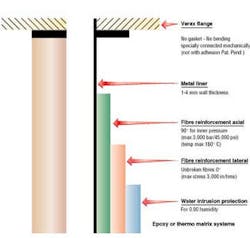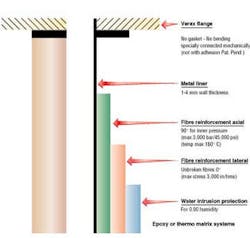RISER DEVELOPMENT: Deepwater composite riser offers major weight, strength improvements
Negotiations are in progress to introduce an advanced drilling service using DUS composite riser technology. The DUS concept, developed by Stockholm-based DUS International, offers significant advantages over conventional steel risers and will be provided as part of a proposed high technology deep water contract drilling service scheduled for launch in spring next year.
Use of a composite steel and GRP riser will be the leading benefit of the DUS drilling service. It is expected to prove attractive to offshore field operators looking to supply floating production, storage, and offloading (FPSO) vessels or semisubmersible platforms in deepwater through a riser that is stronger and lighter and more pressure resistant than the all-steel risers currently available. The DUS' reduced weight gives a corresponding reduction in cost. It is also claimed to out-perform steel risers in all aspects of strength and integrity, and enables risers to be over-specified to provide an extra margin of safety and durability for critical applications.
A DUS riser consists of an inner metal pipe encased in a composite material such as fiberglass which is wound around the core in an automated process capable of producing 1,000 meters of pipe in 24 hours, and incorporating heating elements within the pipe if required. The metal core provides the riser's impermeable surface and can be made from virtually any metal ranging from carbon steel to super duplex or titanium, according to the nature of the gas or oil to be carried. When drilling in deep water a liner of very hard cold rolled carbon steel of 1,600 MPa can also be applied to the riser, increasing resistance to wear dramatically.
Because the DUS will flex by only 3-4% compared with the 45% flexing of steel, it also makes it easier to keep a straight channel to the seabed. If desired a very thin 800 mm wide steel spiral strip can also be laid within each axial layer of GRP at either end of the pipe. This increases the percentage of steel present so that the riser can be constructed using conventional welding techniques if preferred.
Fatigue life improvement
The greater structural strength of the riser is provided by the GRP outer layer which will also have a fatigue life seven times higher than that of an equivalent steel riser. This means that the thickness of the metal core can vary 1-3 mm with the result that a DUS will also weigh 30% of its steel equivalent. Blast tests conducted on DUS pipe by DNV have proved the design to 1,500 bar although the manufacturers believe that it is capable of withstanding 3,000 bar if required.
The light weight of the DUS is expected to prove attractive for operators of older rigs that may only be rated to around 800 meters. It should enable the same rig to work in water depths down to 1,600 meters without the need for costly refits. It could also generate new and competitive charter opportunities in blocks that are uneconomical for newer, more expensive rigs.
The DUS drilling riser/service will also use the Verax non-gasketed connector which is more than 50% lighter than conventional connection methods and can complete a connection within four minutes. The light weight of the pipe will also mean that work on a DUS rig should be easier for the crew as use of Verax connections does not require the heavy tools usually used.
The lightweight DUS pipe has a dynamic density in water of 1 compared to 6.8 for conventional steel risers. The composite coating also has very high tensile strength of 4,000 MPa compared with 2,000 MPa for steel. With its light weight and almost neutral buoyancy, the DUS production riser is envisaged by its designers as being able to rise from the deepwater seabed like a reed to several meters above the surface where a sliding coupling will connect it to the FPSO.
The future of the new system remains uncharted but for operators working in environmentally sensitive areas the ability to install stronger risers at a reduced cost is expected to make the DUS a very attractive prospect.
For more information contact Dag Thulin, DUS International, Tel:+46 86 63 0390, Fax:+46 86 11 4446, Email: [email protected]

